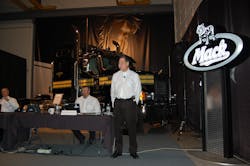Mack Trucks introduces GuardDog Connect telematics system
Starting with the 2015 model year, Mack Trucks is going to integrate a new telematics system into its Pinnacle, Granite, and Titan convention models that will link together its GuardDog onboard maintenance monitoring system to the OEM’s OneCall 24/7 technical support center and ASIST fleet web-based management platform so customers can more proactively respond to engine and aftertreatment system diagnostic trouble codes.
“It’s about remotely determining the level of severity regarding diagnostic fault codes in order to reduce unplanned downtime,” explained David Pardue, Mack’s VP of aftermarket business development, in a press conference held at the OEM’s Customer Center outside Allentown, PA. “It introduces the opportunity to make maintenance decisions about an engine or aftertreatment system problem ahead of time, not after the fact.”
Related in form and function to the remote diagnostics system developed by brother OEM Volvo Trucks, Mack’s GuardDog Connect will be available free of charge to fleets and owner-operators alike for two years on the aforementioned models that begin production on Jan. 2, 2014, with options to buy one to three year extensions for the services ranging in price from roughly $245 to $645 per vehicle.
And aftermarket “kit” is also available for older Mack models that are OBD 2013 compliant, added Pardue, allowing customers to upgrade additional trucks with this technology package.
The GuardDog Connect service also only applies to models powered by Mack proprietary engines and only revolves around 30 or so “critical” diagnostic fault codes that apply to the engine and aftertreatment system, he noted.
“Our technical support team continually ‘data mines’ the fault codes we receive to determine the ones critical to vehicle operation,” Pardue emphasized. “They are divided into ‘yellow’ and ‘red’ groups. The ‘yellow’ codes meaning the vehicle can keep operating, finishing its tasks, with service to be schedules at the customer’s convenience. ‘Red’ codes however require more immediate attention.”
In either the “yellow” or “red” code cases, GuardDog Connect sends an automatic alert to Mack’s OneCall 24/7 customer support center, where technical advisors begin evaluating the situation.
The OEM's experts explained that a case then gets opened in Mack’s ASIST web-based fleet service management platform, with the owner or fleet service manager contacted and the repair planning process initiated through a customer-selected dealer.
Dave Albert, Mack’s director of aftermarket solutions, pointed out that a key piece of this “process” includes verification that a repair bay and the necessary parts are available at the dealership in question, while at the same time specific instructions for the particular repair get forwarded electronically to the technician who will be doing the work.
“That’s what really allows us to from being reactive to proactive,” he said. “Not only are the technicians fully prepared when the truck arrives – with parts and repair instructions in hand – no phone calls are necessary either. We can do this all by e-mail and text messaging, via smart phones, tablets, and iPads. But we can also do all of this over the phone if that is how the customer wants to handle it.”
Pardue noted that the use of GuardDog Connect usually cuts about a day off the total repair time, according to the 12 months of pilot testing the OEM conducted with customer fleets using the system. That day of downtime can equate to as much as $800 to $1,200 per vehicle to a customer, depending on their application, duty cycle, and business, according to Mack’s pilot test results.
“Customers have enough on their minds today without having to worry about the time it takes to diagnose a problem with their vehicle, and get the situation addressed,” noted John Walsh, Mack’s VP of marketing. “It’s about doing everything we can to keep the customer up and running effectively, efficiently, and profitably. Keeping the wheels and revenues rolling is, in a word, mandatory today.”
About the Author
Sean Kilcarr
Editor in Chief
Sean Kilcarr is a former longtime FleetOwner senior editor who wrote for the publication from 2000 to 2018. He served as editor-in-chief from 2017 to 2018.
